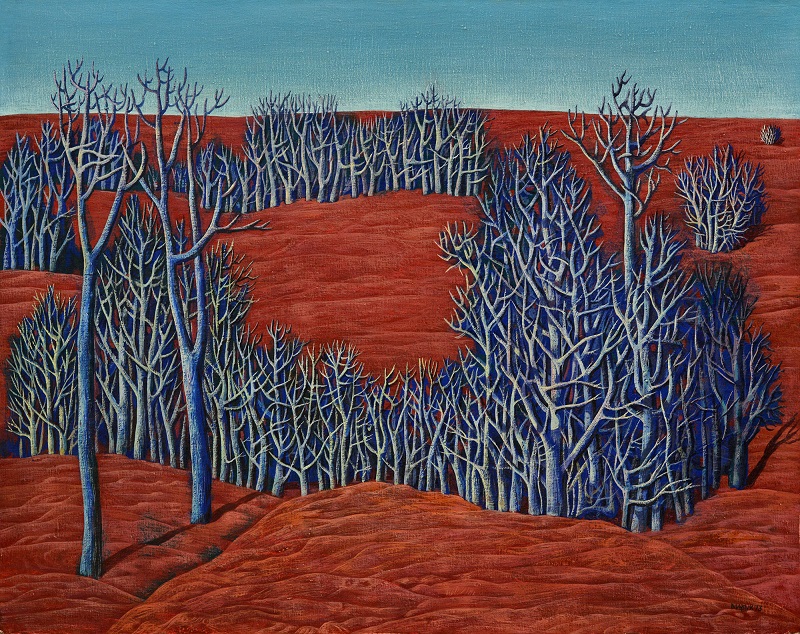Day 26 : Thursday 23 March
Hear our voice, O Lord, according to your faithful love.
| Exodus 32.7-14 | Psalm 106.20-24 | John 5.31-47 |

Ivan Marchuk, "Where are you, my path?" 1989. Kyiv,
Morten Johannes Lauridsen. "Agnus Dei" from Lux Aeterna. Chamber Choir of Europe, cond. Nicol Matt.
C. S. Lewis. Surprised by Joy: The Shape of My Early Life. Geoffrey Bles, 1955.
Extracted from Chapter 14, “Checkmate”.
The odd thing was that before God closed in on me, I was in fact offered what now appears a moment of wholly free choice. In a sense. I was going up Headington Hill on the top of a bus Without words and (I think) almost without images, a fact about myself was somehow presented to me. I became aware that I. was holding something at bay, or shutting something out. Or, if you like, that I was wearing some stiff clothing, like corsets, or even a suit of armour, as if I were a lobster. I felt myself being, there and then, given a free choice. I could open the door or keep it shut; I could unbuckle the armour or keep it on. Neither choice was presented as a duty; no threat or promise was attached to either, though I knew that to open the door or to take off the corslet meant the incalculable. The choice appeared to be momentous but it was also strangely unemotional. I was moved by no desires or fears. In a sense I was not moved by anything. I chose to open, to unbuckle, to loosen the rein. I say, “I chose,” yet it did not really seem possible to do the opposite. On the other hand, I was aware of no motives. You could argue that I was not a free agent, but I am more inclined to think that this came nearer to being a perfectly free act than most that I have ever done. Necessity may not be the opposite of freedom, and perhaps a man is most free when, instead of producing motives, he could only say, “I am what I do.” Then came the repercussion on the imaginative level. I felt as if I were a man of snow at long last beginning to melt. The melting was starting in my back—drip-drip and presently trickle-trickle. I rather disliked the feeling.
The fox had been dislodged from Hegelian Wood and was now running in the open, “with all the wo in the world,” bedraggled and weary, hounds barely a field behind. And nearly everyone now (one way or another) in the pack; Plato, Dante, MacDonald, Herbert, Barfield, Tolkien, Dyson, ]oy itself. Everyone and everything had joined the other side. Even my own pupil Griffiths—now Dom Bede Griffiths—though not yet himself a believer, did his share. Once, when he and Barfield were lunching in my room, I happened to refer to philosophy as “a subject.” “It wasn’t a subject to Plato,” said Barfield, “it was a way.” The quiet but fervent agreement of Griffiths, and the quick glance of understanding between these two, revealed to me my own frivolity. Enough had been thought, and said, and felt, and imagined. It was about time that something should be done.
For of course there had long been an ethic (theoretically) attached to my Idealism. I thought the business of us finite and half-unreal souls was to multiply the? consciousness of Spirit by seeing the world from different positions while yet remaining qualitatively the same as Spirit; to be tied to a particular time and place and set of circumstances, yet there to will and think as Spirit itself does. This was hard; for the very act whereby Spirit projected souls and a world gave those souls different and competitive interests, so that there was a temptation to selfishness. But I thought each of us had it in his power to discount the emotional perspective produced by his own particular selfhood, just as we discount the optical perspective produced by our position in space. To prefer my own happiness to my neighbour’s was like thinking that the nearest telegraph post was really the largest. The way to recover, and act upon, this universal and objective vision was daily and hourly to remember our true nature, to reascend or return into that Spirit which, in so far as we really were at all, we still were. Yes; but I now felt I had better try to do it. I faced at last (in MacDonald’s words) “something to be neither more nor less nor other than done“. An attempt at complete virtue must be made.
Really, a young Atheist cannot guard his faith too carefully. Dangers lie in wait for him on every side. You must not do, you must not even try to do, the will of the Father unless you are prepared to “know of the doctrine.” All my acts, desires, and thoughts were to be brought into harmony with universal Spirit. For the first time I examined myself with a seriously practical purpose. And there I found what appalled me; a zoo of lusts, a bedlam of ambitions, a nursery of fears, a hareem of fondled hatreds. My name was legion.
(Continued on Day 27, tomorrow.)
May God our Redeemer show us compassion and love. Amen.